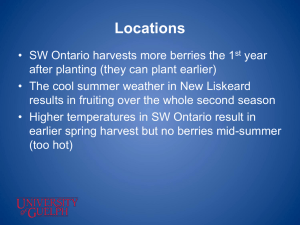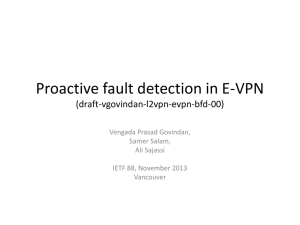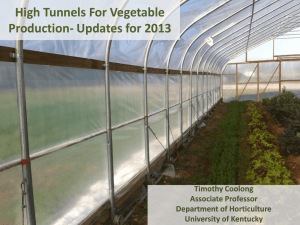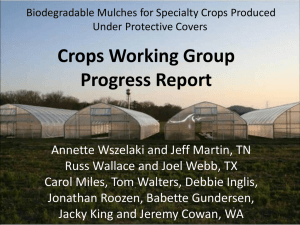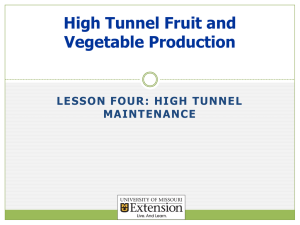Tunnels - University of Arkansas
advertisement
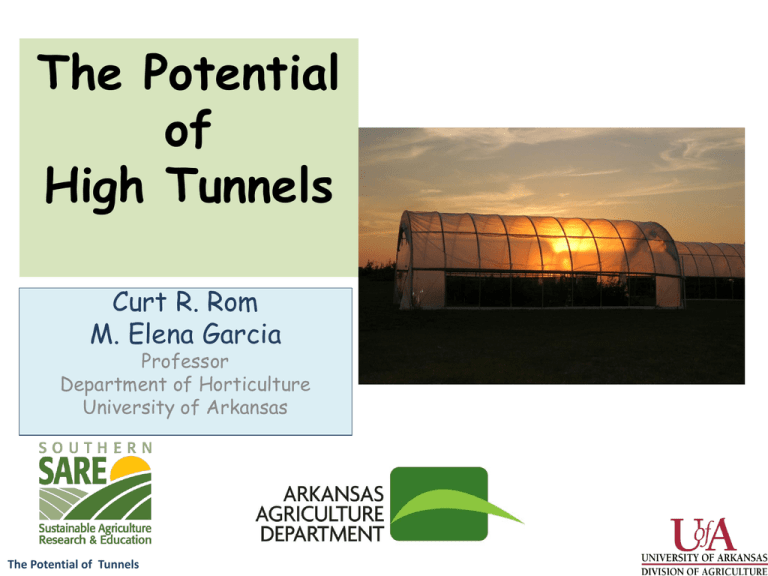
The Potential of High Tunnels Curt R. Rom M. Elena Garcia Professor Department of Horticulture University of Arkansas The Potential of Tunnels Terms Tunnels or Hoophouses High Tunnels Low Tunnels The Potential of Tunnels What is a “Tunnel” Characteristics (varying degrees) – “Temporary”, not permanent • Minimal Construction • Possibly movable – Plastic Covered – No forced temperature modification • (or limited modification) • No heater or cooling system; no forced air • Passive temperature controls – No supplemental lighting system – Growing in the “floor” • – natural soil – Relatively “Cheap” • – inexpensive to construct and operate The Potential of Tunnels Temporary • The covering may be seasonal • The structure may be moved around a farm • Many are semi-permanent, but no permanent structures inside – you can move crops around within the structure The Potential of Tunnels Temperature Control • Passively heated – solar heated – May have supplemental heat for some crops or for survival of lethal temperatures – May have additional solar heat collectors – May have “blankets” to trap heat • Passively cooled – Roll-up the sides, open the doors, open the roof – Misting for evaporative cooling The Potential of Tunnels The Potential of Tunnels Tunnels • High Tunnels – Typically > 6 ft height • Low Tunnels – Typically < 6ft height • Row Covers The Potential of Tunnels The Potential of Tunnels The Potential of Tunnels The Potential of Tunnels Row Covers The Potential of Tunnels Why Tunnels? Environmental Modification with A. Temperature Modification B. Precipitation and Moisture Modification Thereby allowing the grower to 1. Extend the growing season • Advance the Spring Season • Extend the Autumn Season 2. Minimize impacts of rain (hail, wind, etc.) 3. Mitigate Pest Problems The Potential of Tunnels The Benefits from Tunnels • Never a “lost day” due to rain – You will always have crop to sell • Extended Season means – Extended Cash-Flow for the farm – Capture high value markets – More efficient use of equipment and labor • Reduced Risks from the weather – Protect the crops • Potential Reduced use of Pesticides The Potential of Tunnels The Challenges of High Tunnels • Temperature Management – High daytime temperatures – Low nighttime temperatures • Heat Retention • Frost Protection • Water Management • Pest Management • Crop Rotations The Potential of Tunnels Opportunities for Specialty Crops • Traditional Crops for the Region • High Value Crops • Suited to Multiple Markets – On-farm sales • Agritourism/Agri-entertainment – Farmers’ Markets – Local Retail The Potential of Tunnels The Potential For Tunnels Extending the Season, Better Environment The Specialty Crops Flowers Vegetables and Herbs Fruit Crops The Potential of Tunnels A Place for Tunnels Tunnels have a place in the production system to compliment field production The Potential of Tunnels Why Fruit in Tunnels? Review: 1. Produce fruit out of season to capture high value markets 2. The opportunity to produce fruit sustainably and organically The Potential of Tunnels Potential For Fruit in Tunnels Easier – Strawberries • Spring, fall – Blackberries and Raspberries • Spring/Autumn – Blueberries • Spring More Difficult – Peaches and Cherries • Spring The Potential of Tunnels Opportunities of High Tunnels • Early Spring Production – March-May – Traditional Floricane blackberries and Raspberries – Strawberries – Blueberries • Late Fall Production – Oct-Dec – Primocane Blackberries and Raspberries – Strawberries The Potential of Tunnels No Obvious Potential • Apples • Pear • Grapes?? – Tunnels will not alter harvest season significantly – Tunnels may be used to protect from hail, and to minimize diseases on foliage and fruit – May have a place in Organic Production The Potential of Tunnels Potential for High Tunnel Fruit Production • Season Extension – Alternative Season – Longer marketing period for the crop beyond cultivar selection – High Value: Price Premiums as high as 100% • Reducing Risk of Weather on the crop – Hail, rain, sunburn, frosts, etc. • Reducing the Risk of Damage from pests – – – – Growing group out-of-cycle of pests Pest exclusion with screening Reduced pesticide need Possible Organic Production • Increased Price Premiums The Potential of Tunnels Potential Total Berry Harvest Season } Traditional Season Growing Season Early Tunnel Crop Early Tunnel Crop Harvest Seasons Jan Feb Mar Apr May Jun Jul Aug Sep Oct Nov Dec Tunnels may extend the summer harvest season from 4-6 weeks during summer to 16-20 weeks during the year The Potential of Tunnels Our Observations and Conclusions • Tunnels can shift harvest dates – approximately 2-3 earlier than field for berries in NWA – Extended Autumn season several weeks – Saw months differences in other regions • Increase in Product Size – Increase in fruit and vegetable product size • Increased Yields – Due to less stress, increased product size The Potential of Tunnels Problems for High Tunnel Fruit Production • Problems with tunnel temperature management – Opening and closing the tunnels – Over-heating – “Super-cooling” • • • • Problem of increased frost risk Problems with irrigating during the winter Problems with markets being open Problem with investment costs and return on the investment The Potential of Tunnels Observations from China • More than 1m acres of tunnels in China! • Flowers, Vegetables, Fruits – Strawberries and Peaches in Feb-Mar! • • • • • • • Three-sided, half-tunnels and Recessed tunnels Keep tunnels “tight” Special Designs (lean-to) for winter production Grow Vertical! Insect Control: Screening and sticky cards Blankets, Shading Overplant misting for cooling The Potential of Tunnels The Potential of Tunnels The Potential of Tunnels Summary • There is potential and opportunities for High Tunnel production, especially for local markets • High Tunnels excellent potential for Season Extension; Good Potential for reduced pesticide use • Tunnels should be a part of a farm management and profitability plan to compliment field operations • Technology and management of organic and/or tunnel fruit production not thoroughly proven for our region The Potential of Tunnels Acknowledgements • • • • • • • • • Dr. C. R. Rom Dr. D.T. Johnson Dr. T. Kirkpatrick J. Popp C. Vincent D. Dickey H. Friedrich J. McAfee M. Holladay The Potential of Tunnels Thanks! The Potential of Tunnels
